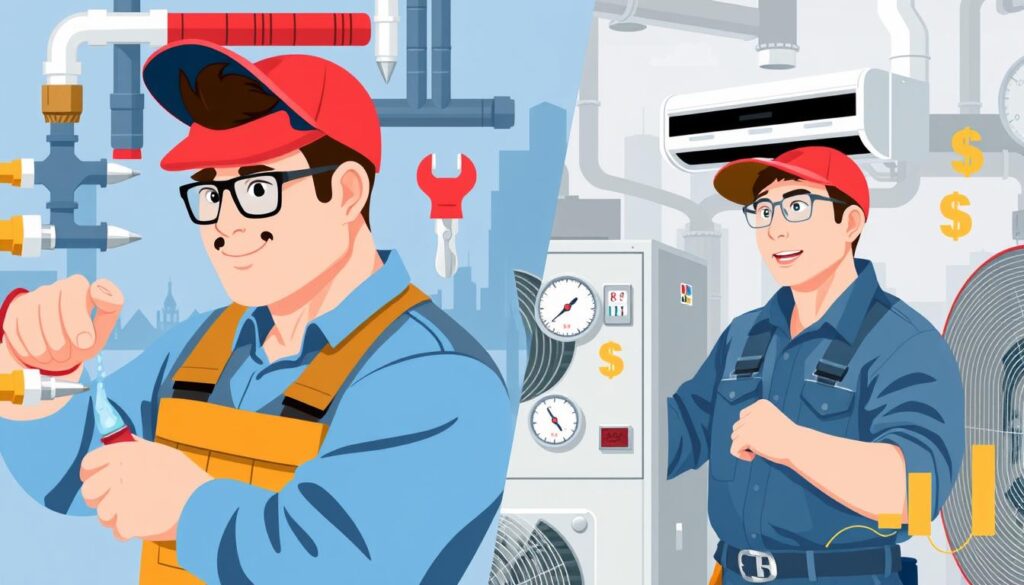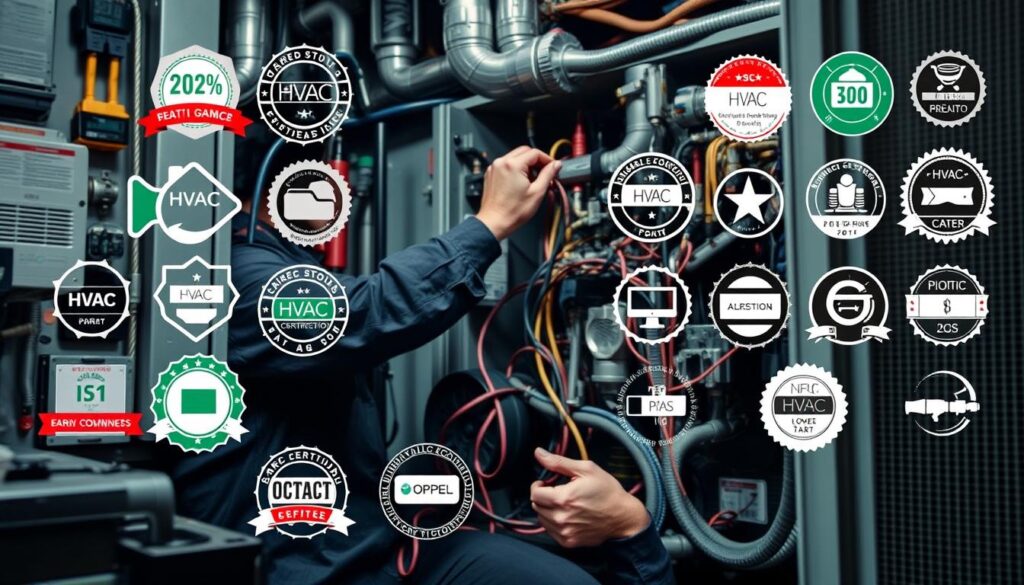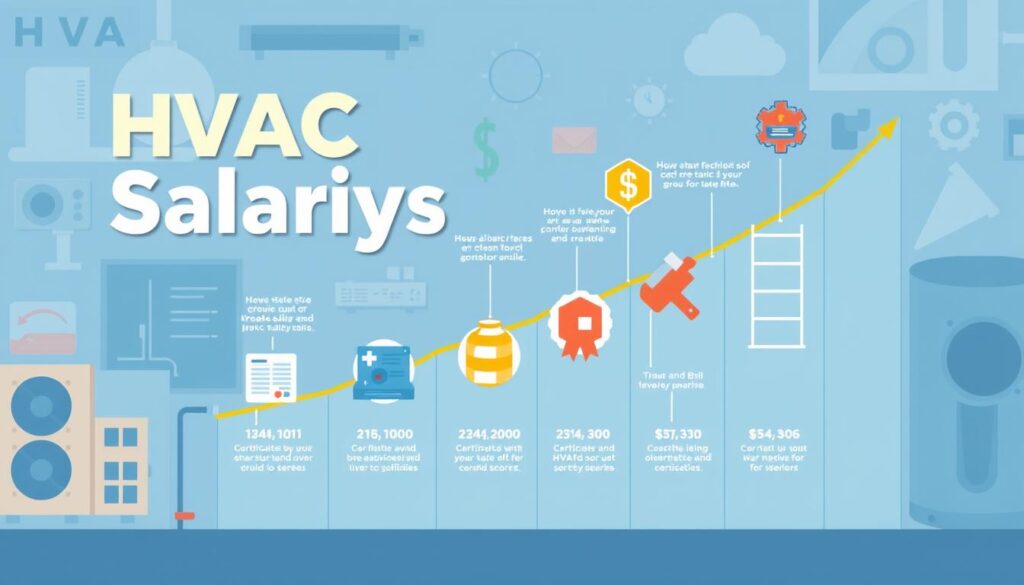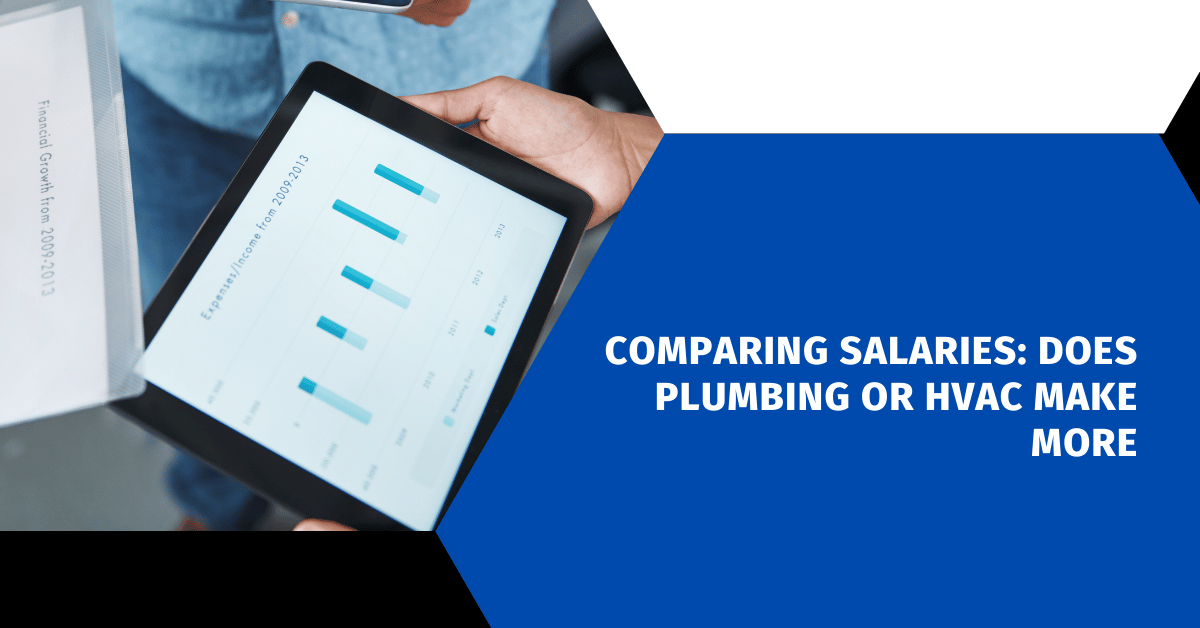Affiliate Disclosure
HVAC Guide Guys is a participant in the Amazon Services LLC Associates Program, an affiliate advertising program designed to provide a means for sites to earn advertising fees by advertising and linking to Amazon.
Does Plumbing or HVAC Make More? As I thought about my career, a big question kept popping up: should I choose plumbing or HVAC? Both are stable jobs with good pay. But which one pays more? It’s not as simple as it seems.

The Bureau of Labor Statistics says plumbers make $59,880 a year on average. HVAC techs earn $50,590. Electricians make a bit more at $60,040. These jobs are solid, with lots of demand. But, where you live, how long you’ve worked, and what you specialize in can change how much you earn.
Key Takeaways
- Plumbers earn a higher median annual salary of $59,880 compared to HVAC technicians at $50,590.
- Electricians have the highest median annual salary at $60,040 among the three trades.
- Salaries can vary greatly based on geographic location, with some states offering significantly higher pay.
- Continued education and specialized skills can lead to higher earning potential for both plumbers and HVAC technicians.
- Union jobs often provide higher salaries and more comprehensive benefits than non-union positions.
Table of Contents
Understanding the Salary Landscape in Trades
The job market for skilled trades like plumbing and HVAC is booming. There’s a steady demand for skilled workers. Knowing how salaries vary and what affects them can guide aspiring tradesmen in their careers.
National Average Earnings
Plumbers earn about $61,550 a year on average. HVAC technicians make around $57,300 annually. But, these numbers can change a lot based on where you work, how long you’ve been doing it, and other factors.
Factors Affecting Income Potential
- Geographic location: In places with high living costs and lots of building, plumbers and HVAC techs get paid more.
- Years of experience: More experienced workers in these trades usually make more money than newbies.
- Specialized skills and certifications: Getting extra certifications or focusing on certain areas can increase your pay.
- Union membership: Being in a union can mean higher wages and better benefits for plumbers and HVAC techs.
- Overtime and emergency services: Both trades offer chances for overtime and emergency work, which can really boost your earnings.
Knowing these factors can help aspiring tradesmen make smart choices for their careers. This way, they can earn more in the competitive job market.
“The skilled trades offer rewarding career paths with competitive salaries and strong job security. By understanding the factors that influence income potential, individuals can make strategic choices to maximize their earnings and long-term career growth.”
Explore Our HVAC Shop
Looking for top-rated HVAC tools, parts, and accessories? Visit our shop and find the perfect solution for your needs.
Visit the ShopDoes Plumbing or HVAC Make More: A Direct Comparison
Many wonder if plumbing or HVAC pays more. The truth is, it’s not just about the money. Several factors influence the earnings of these skilled trades.
Plumbers usually earn more than HVAC technicians. The Bureau of Labor Statistics reports plumbers make a median of $54,620 yearly. HVAC techs earn about $46,880, which is a $9,290 difference.
The pay gap is due to extra training and licenses for plumbers. Both need 8,000 hours of training to become journeymen. But, plumbers take 3-5 years to apprentice, while HVAC techs take 3-4. Plumbers also learn welding, expanding their job scope.
| Metric | Plumbing | HVAC |
|---|---|---|
| Median Annual Wage | $54,620 | $46,880 |
| Job Growth Rate | 21% | 21% |
| Training Hours to Journeyman | ~8,000 | ~8,000 |
| Apprenticeship Duration | 3-5 years | 3-4 years |
Both trades offer good pay and career growth. Your choice should depend on your interests, skills, and career goals, not just salary.
In conclusion, whether plumbing or HVAC pays more varies. Both trades can be fulfilling and profitable for skilled workers.
Geographic Variations in Trade Salaries
Salaries for plumbing and HVAC jobs vary a lot based on where you are. Alaska, Illinois, Massachusetts, New Jersey, and New York pay the most. This is because of high demand in these areas, especially during construction booms.
The cost of living also affects how much you earn. Places with a high cost of living, like coastal states, often pay more. This is to keep skilled workers like plumbers and HVAC techs.
| State | Median Annual Salary for Plumbers | Median Annual Salary for HVAC Technicians |
|---|---|---|
| Alaska | $70,320 | $61,450 |
| Illinois | $63,220 | $55,070 |
| Massachusetts | $68,590 | $59,780 |
| New Jersey | $66,790 | $58,170 |
| New York | $69,420 | $60,480 |
Knowing how salaries vary by location helps you choose where to work. You can think about cost of living, demand, and how much you can earn. This way, you can make a career choice that fits your goals.
Experience Levels and Salary Growth
Your experience level greatly affects your earnings in plumbing and HVAC trades. Starting salaries are similar, but more experienced workers earn much more. As you progress from apprentice to journeyman to master, your pay increases with your responsibilities.
HVAC technicians’ salaries vary with experience. Those new to the field earn about $22.47 an hour. But, those with over 10 years of experience make around $32.83 an hour. The median salary is $48,730. The highest earners make up to $77,920, while the lowest make $30,610.
To increase your earnings, keep learning and improving your skills. Getting certifications like EPA 608 and NATE Core tests can help. Also, staying current with industry trends and enhancing your sales skills can boost your trade career earnings.
“The more knowledge and expertise you gain, the higher your skilled labor pay comparison will be in the job market.”
The HVAC industry is seeing a 15% increase in job openings by 2026. This shortage means experienced technicians can earn more, especially in places like Alaska, Hawaii, and the East Coast.
Explore Our HVAC Shop
Looking for top-rated HVAC tools, parts, and accessories? Visit our shop and find the perfect solution for your needs.
Visit the ShopUnion vs Non-Union Compensation Differences
Wages and benefits in plumbing and HVAC vary between union and non-union jobs. Union jobs usually pay more and offer better benefits than non-union ones.
Union Benefits Package Overview
Union plumbers and HVAC techs get a better benefits package. This includes:
- Higher hourly wages
- Comprehensive health insurance coverage
- Retirement plans, such as pensions and 401(k) contributions
- Paid vacation and sick leave
- Job security through collective bargaining agreements
Non-Union Salary Structures
Non-union workers in plumbing and HVAC have more say in their pay. They can earn $30 to $39 per hour, based on the job market and experience. This flexibility can lead to better pay. But, they lack the union’s bargaining power, which means less job security and benefits.
Choosing between union and non-union work affects your pay and job happiness in plumbing and HVAC. Knowing the differences is key for those looking for well-paying jobs in skilled trades.
Certification Impact on Earning Potential
Certifications play a big role in the skilled trades, especially for hvac technicians and plumbers. Getting specialized certifications can lead to better-paying jobs and career growth.
HVAC technicians need an EPA certification for refrigerants. This shows you know your stuff and is often needed for many HVAC jobs. Also, getting certifications from groups like the Refrigeration Service Engineers Society (RSES) can increase your pay by up to 30%.
Plumbers can also see pay boosts with special certifications. For example, in medical gas systems or fire protection. These show you’re skilled and knowledgeable, making you more valuable to employers and possibly leading to better-paying jobs.
| Certification | Potential Salary Impact |
|---|---|
| EPA Certification (HVAC) | Up to 30% increase |
| RSES Certification (HVAC) | Up to 30% increase |
| Medical Gas Systems Certification (Plumbing) | Increased earning potential for specialized roles |
| Fire Protection Certification (Plumbing) | Increased earning potential for specialized roles |
Getting the right certifications can set hvac technicians and plumbers apart. It shows you’re an expert and can lead to higher salaries. These certifications can also open doors to higher roles, like management, which can increase your earnings even more over time.

Explore Our HVAC Shop
Looking for top-rated HVAC tools, parts, and accessories? Visit our shop and find the perfect solution for your needs.
Visit the ShopOvertime and Emergency Service Income
For those in residential service vocations like plumbing and lucrative technical professions such as HVAC, overtime and emergency service income can greatly increase earnings. HVAC technicians, for example, can make more money during peak seasons and by taking on after-hours service calls.
After-Hours Service Rates
HVAC technicians can earn more for emergency work done outside regular hours. This includes evenings, weekends, and holidays when heating and cooling repairs are most needed. Working irregular hours can lead to higher pay that adds to their base salary.
Peak Season Earnings
The HVAC industry’s seasonality offers chances for higher earnings. In summer, air conditioning is in high demand, and in winter, heating systems need maintenance and repair. HVAC technicians can work more hours and earn overtime pay, boosting their annual income.
| Earnings Category | Average Annual Wage |
|---|---|
| Entry-Level HVAC Technician | $40,000 |
| Mid-Level HVAC Technician | $50,000 – $60,000 |
| Senior HVAC Technician | $75,000+ |
HVAC technicians can increase their earnings by taking advantage of overtime and emergency service opportunities. This is within the residential service vocations and lucrative technical professions.
Specialization Opportunities and Higher Pay
In both plumbing and HVAC, specializing can lead to higher pay. HVAC technicians can focus on areas like refrigeration or energy auditing. Plumbers can specialize in medical gas systems or fire protection. These roles often pay more because they require advanced skills.
HVAC technicians in Washington State earn an average of $63,283 a year. In Seattle, they make about $70,000. Oregon’s HVAC technicians earn $63,261 on average, with Portland’s at around $59,000.
The HVAC industry is set to grow by 13% by 2028. States like Florida and California will need more HVAC professionals. This demand is driven by construction growth and the need for skilled labor pay comparison. Specializing in areas like refrigeration can lead to high-paying blue collar jobs.
“The skilled trades industry provides opportunities for financial growth and stability through overtime, bonuses, and specialized certifications.”
Plumbers who specialize in certain areas can also earn more. The demand for skilled tradespeople, including plumbers and HVAC technicians, is strong. This means there are many chances for those who develop specialized skills.
Career Advancement and Salary Progression
The plumbing and HVAC industries offer great chances for career growth and higher pay. As you get more experience and skills, you can take on bigger and more profitable jobs. This can greatly increase your trade career earnings.
Management Positions
Getting into management is a clear way to earn more in the trades. Jobs like supervisor, project manager, or service manager pay more than regular technician roles. These jobs need technical skills, leadership, and business knowledge.
Business Ownership Potential
For those who want to be their own boss, plumbing and HVAC are good choices. Lucrative technical professions like these let you start your own business. This can lead to unlimited income if you have the right skills and business knowledge.
Advancing in the trades comes from experience, extra certifications, and leadership skills. By growing your knowledge and skills, you can get better-paying jobs. This will help you earn more throughout your trade career.
| Position | Average Annual Salary |
|---|---|
| Entry-Level Technician | $30,000 – $40,000 |
| Mid-Level Technician | $50,000 – $65,000 |
| Senior Technician/Specialist | $70,000 – $80,000 |
| HVAC Engineer | $80,000 – $100,000 |
The table shows that HVAC offers big earning potential, especially in specialized and management roles. By improving your skills and looking for new opportunities, you can find more rewarding jobs in lucrative technical professions.

Explore Our HVAC Shop
Looking for top-rated HVAC tools, parts, and accessories? Visit our shop and find the perfect solution for your needs.
Visit the ShopIndustry Demand and Job Security
Both plumbing and HVAC have strong job security due to steady demand. The Bureau of Labor Statistics says these fields will grow about 5% in the next ten years. This growth is because of new buildings, old infrastructure, and complex systems.
These high-paying blue collar jobs are key to keeping things running smoothly. HVAC techs, for example, help make systems more efficient and cut down on pollution. This makes them very important in their field.
Choosing to be an HVAC tech or plumber means less debt than college. Training programs are cheaper and get you working faster. Plus, you get to learn on the job, which means you can earn more as you get better.
| Job Outlook | Median Salary | Top Earners |
|---|---|---|
| Projected 5% growth in the next decade | $48,730 for HVAC technicians $57,300 for plumbers | Up to $77,920 for HVAC technicians Up to $104,000 for plumbers |
There’s a big need for skilled workers in HVAC and plumbing all over the country. Some states like California, Florida, Ohio, Texas, and Illinois pay more for these jobs.
In summary, plumbing and HVAC offer great job security and pay. They’re good choices for those looking for stable, well-paying jobs without a lot of debt.
Explore Our HVAC Shop
Looking for top-rated HVAC tools, parts, and accessories? Visit our shop and find the perfect solution for your needs.
Visit the ShopTraining Investment vs Return on Income
Trade careers like plumbing and HVAC need a lot of training, often 4-5 years of apprenticeships. But, the pay can be great, making them solid middle-class jobs. You earn while you learn, which helps cover the cost of training.
Continuing education and extra certifications can boost your earnings. This can lead to better-paying jobs. The Bureau of Labor Statistics says plumbers and HVAC workers made $25.92 an hour in 2018.
In places like New York, plumbers made about $76,410 that year. Training costs vary, but Apex Technical School’s plumbing program is $17,816 plus $590 for books. Yet, 46% of students get federal aid and finish on time, 30 weeks.
HVAC technicians start at around $48,730 a year. Hiring one can cost $75 to $150 an hour. The initial investment is big, but the steady income and job security are worth it.
| Occupation | Average Salary | Hourly Rate Range | Training Cost | Completion Rate |
|---|---|---|---|---|
| Plumber | $53,910 per year | $45 – $150 per hour | $17,816 for 30-week program | 46% within 30 weeks |
| HVAC Technician | $48,730 per year | $75 – $150 per hour | N/A | N/A |
| Carpenter | $48,330 per year | $35 – $100 per hour | N/A | N/A |
Skilled trades like plumbing and HVAC offer a good return on investment. The cost of education is high, but the job security and pay are worth it. These careers are great for those looking for a stable and rewarding job.
Conclusion
Both plumbing and HVAC offer good career paths with decent pay. Plumbers usually make more than HVAC technicians. But, it’s important to think about more than just does plumbing or hvac make more.
Your choice should match your interests, work style, and future plans. Both trades allow for specialization and growth. They also offer chances for making good money on your own. Knowing about plumbing vs hvac wages is just part of the decision.
Whether you pick plumbing or HVAC, keep learning and networking. Skills, soft skills, and a love for learning are key. You’ll find success and a good income in a field that makes a real difference.

